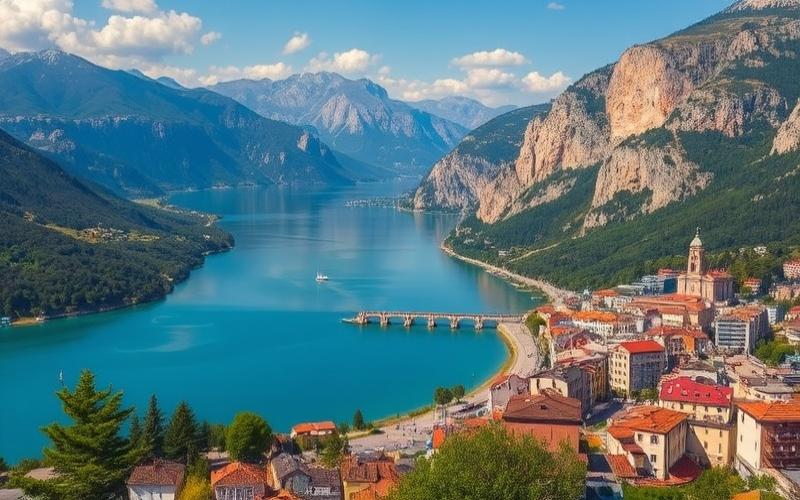
 Published on and written by Cyril Jarnias
Published on and written by Cyril Jarnias
Montenegro, a small Balkan country bordered by the Adriatic Sea, offers growing economic potential for bold entrepreneurs. With its upcoming accession to the European Union and efforts to diversify its economy, Montenegro is positioning itself as an attractive destination for investors and business creators. Let’s explore together the opportunities and challenges awaiting entrepreneurs in this rapidly transforming country.
Resilient Economic Growth Despite Challenges
Montenegro has experienced an impressive growth trajectory in recent years, despite external shocks and the COVID-19 pandemic. After a 15% contraction in 2020, the Montenegrin economy rebounded with 12% growth in 2021, followed by 6% in 2022 and 2023. This resilience demonstrates the country’s adaptability and development potential.
For 2025, forecasts remain optimistic with expected growth exceeding 4%. This positive momentum is supported by several factors:
- Recovery of the tourism sector, a pillar of the Montenegrin economy
- Massive investments in infrastructure
- Growing influx of foreign direct investments
- Gradual economic diversification toward higher value-added sectors
However, it’s important to note that Montenegro remains an economy susceptible to external shocks due to its dependence on tourism and external funding. Entrepreneurs must therefore be aware of this potential volatility and adapt their strategies accordingly.
Good to Know:
Montenegro demonstrates solid economic growth despite recent challenges, offering a dynamic environment for entrepreneurs. However, dependence on tourism and external funding requires a cautious and diversified approach.
Government Policies Favorable to Entrepreneurship
The Montenegrin government has made attracting investments and supporting entrepreneurship a national priority. This commitment translates into several concrete initiatives:
Attractive Tax Regime: Montenegro offers one of Europe’s lowest corporate tax rates at just 9%. Additionally, new businesses can benefit from corporate tax exemption during their first years of operation.
Subsidies and Incentives: The government has established various financial support programs, covering up to 50% of eligible costs for innovative and job-creating projects.
Administrative Simplification: Procedures for starting a business in Montenegro have been significantly simplified, with an average registration time of only 5 business days.
Support for Innovation: The country is investing in creating a startup-friendly ecosystem, with the development of technology parks and business incubators.
These measures have already borne fruit, with a 30% increase in the number of new businesses created in recent years. The government continues its efforts to further improve the business environment, particularly in view of EU accession planned by 2030.
Good to Know:
Montenegro offers a very favorable fiscal and regulatory framework for entrepreneurs, with low tax rates, generous subsidies, and simplified administrative procedures. These advantages make it a prime destination for business creation in Europe.
Emerging Sectors Offering Promising Opportunities
While tourism remains a pillar of the Montenegrin economy, the country is striving to diversify its economic fabric. Several emerging sectors offer promising opportunities for entrepreneurs:
Information Technology and Digital: Montenegro is betting on developing its technology industry. Software development, artificial intelligence, and fintech are particularly dynamic fields. The country is attracting increasing numbers of digital nomads and tech entrepreneurs, drawn by the quality of life and competitive operational costs.
Renewable Energy: With its hydroelectric, wind, and solar potential, Montenegro offers numerous opportunities in the green energy sector. The government actively encourages investments in this area to diversify its energy mix.
Organic Agriculture and Food Processing: The quality of Montenegrin agricultural land and growing demand for organic products create interesting opportunities in this sector, particularly for export to the European Union.
Business Services and Outsourcing: With the growing arrival of foreign companies, the business services market (consulting, accounting, marketing) is expanding rapidly. The country is also positioning itself as an attractive destination for outsourcing certain functions.
Health and Wellness: Medical tourism and the wellness sector are experiencing rapid growth, leveraging the country’s exceptional natural environment and developing infrastructure.
These sectors often benefit from specific government support, whether through tax incentives or targeted subsidies. Entrepreneurs who position themselves in these growing markets can benefit from strong development potential.
Good to Know:
Beyond traditional tourism, Montenegro offers promising opportunities in technology, renewable energy, organic agriculture, and business services. These emerging sectors often benefit from specific government support.
Like any emerging market, Montenegro presents both risks and opportunities for entrepreneurs. Understanding this environment is crucial to maximizing success chances.
Opportunities:
- Growing market with increasing purchasing power
- Relatively low operational costs compared to Western Europe
- Strategic geographic location at the crossroads of the Balkans and Adriatic
- EU accession process stimulating reforms and investments
- High quality of life attracting international talent and investors
Risks:
- Economic dependence on tourism and vulnerability to external shocks
- Limited domestic market size (approximately 600,000 inhabitants)
- Growing competition as the country attracts more investors
- Challenges related to corruption and bureaucracy, though improving
- Regional geopolitical uncertainties
To successfully navigate this environment, entrepreneurs should adopt a strategic approach:
1. Diversification: Don’t rely solely on the local market or a single business sector. Aim for export and explore synergies between different domains.
2. Local Partnerships: Collaborating with local players can facilitate market understanding and access to business networks.
3. Innovation: Stand out through innovation and quality to face increasing competition.
4. Flexibility: Be ready to quickly adapt to regulatory and economic changes, particularly in the context of EU accession.
5. Due Diligence: Conduct thorough research and surround yourself with experienced advisors to navigate the local legal and fiscal environment.
Good to Know:
Montenegro offers real opportunities for entrepreneurs but also carries risks. A strategic approach based on diversification, innovation, and local partnerships is essential for success in this evolving market.
Long-term Forecast: A Promising Future Despite Challenges
Long-term prospects for Montenegro are generally positive, driven by several structural factors:
European Union Accession: Montenegro is considered the most likely next candidate to join the EU, with accession envisioned by 2028-2030. This prospect stimulates economic and institutional reforms and should attract more foreign investment.
Infrastructure Development: Major infrastructure projects are underway or planned, particularly in transportation and energy. These investments will improve the country’s connectivity and economic competitiveness.
Digital Transition: The government is betting on the digitalization of the economy and administration. This transformation offers numerous opportunities for innovative businesses.
Economic Diversification: Efforts to reduce dependence on tourism and develop higher value-added sectors should bear fruit long-term, making the economy more resilient.
Growing Attractiveness for International Talent: Quality of life, advantageous tax regime, and development of the entrepreneurial ecosystem are attracting increasing numbers of entrepreneurs and qualified professionals worldwide.
However, several challenges must be addressed to fully realize this potential:
- Strengthening the rule of law and fighting corruption
- Improving the education system to meet modern economy needs
- Sustainable management of tourism development and environmental protection
- Reducing regional disparities between the developed coast and inland areas
Long-term economic forecasts remain optimistic, with projected average annual growth between 3% and 4% for the next decade. This growth should be accompanied by continuous improvement in living standards and strengthening of Montenegro’s position as a regional economic hub.
For entrepreneurs, these prospects offer a promising horizon. Businesses establishing themselves in Montenegro today and capable of accompanying its economic transformation will be ideally positioned to benefit from its future growth.
Good to Know:
Montenegro’s long-term prospects are promising, driven by EU accession and economic diversification. Entrepreneurs establishing themselves today can fully benefit from this future growth while contributing to addressing the country’s development challenges.
In conclusion, Montenegro offers fertile ground for visionary entrepreneurs. With its sustained economic growth, business-friendly policies, and dynamic emerging sectors, the country presents numerous opportunities. Although challenges persist, long-term prospects are encouraging, particularly with the EU accession perspective. Entrepreneurs who can navigate this evolving environment, combining innovation, adaptability, and understanding of the local market, will be well-positioned to succeed and contribute to Montenegro’s economic development.
Disclaimer: The information provided on this website is for informational purposes only and does not constitute financial, legal, or professional advice. We encourage you to consult qualified experts before making any investment, real estate, or expatriation decisions. Although we strive to maintain up-to-date and accurate information, we do not guarantee the completeness, accuracy, or timeliness of the proposed content. As investment and expatriation involve risks, we disclaim any liability for potential losses or damages arising from the use of this site. Your use of this site confirms your acceptance of these terms and your understanding of the associated risks.
















